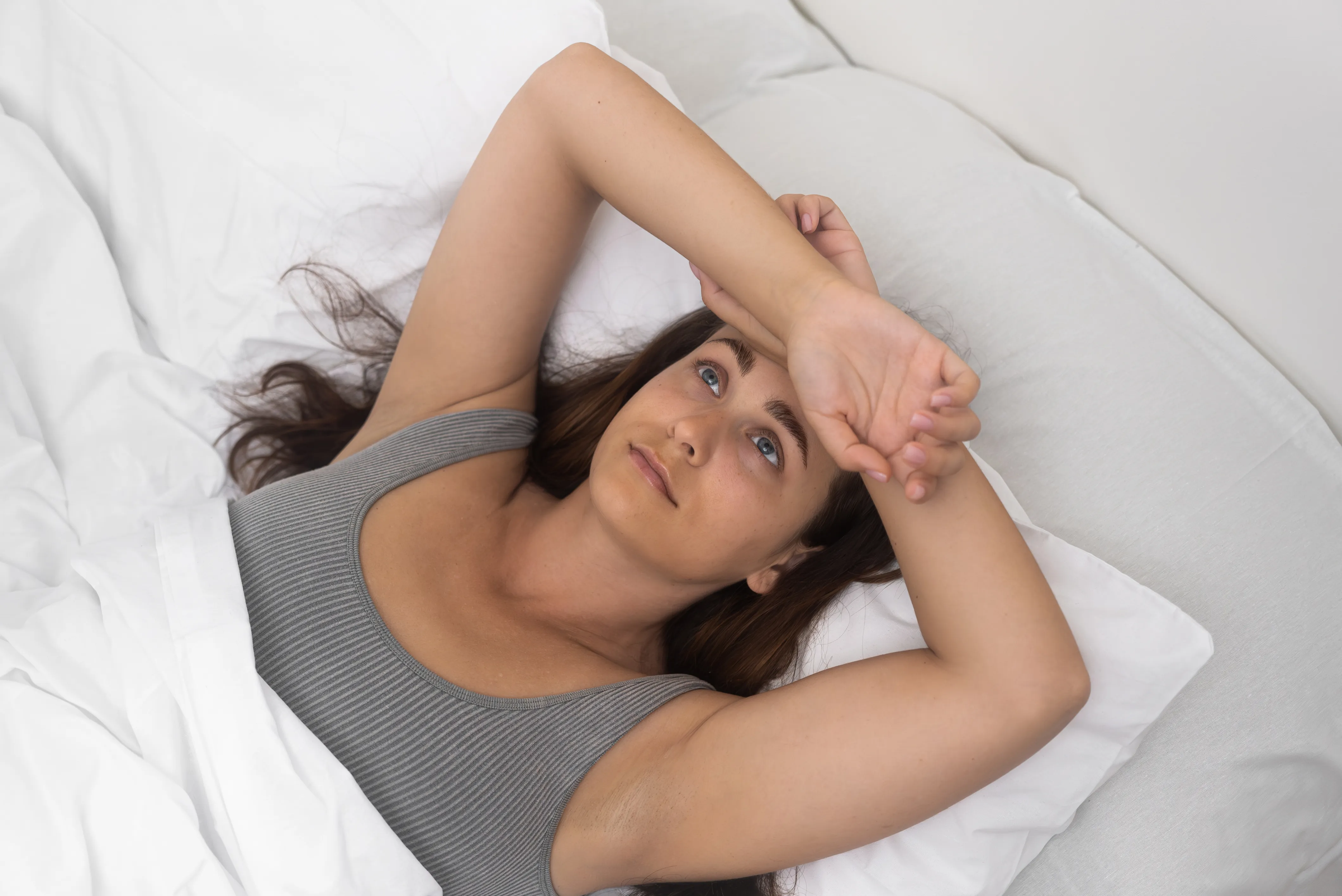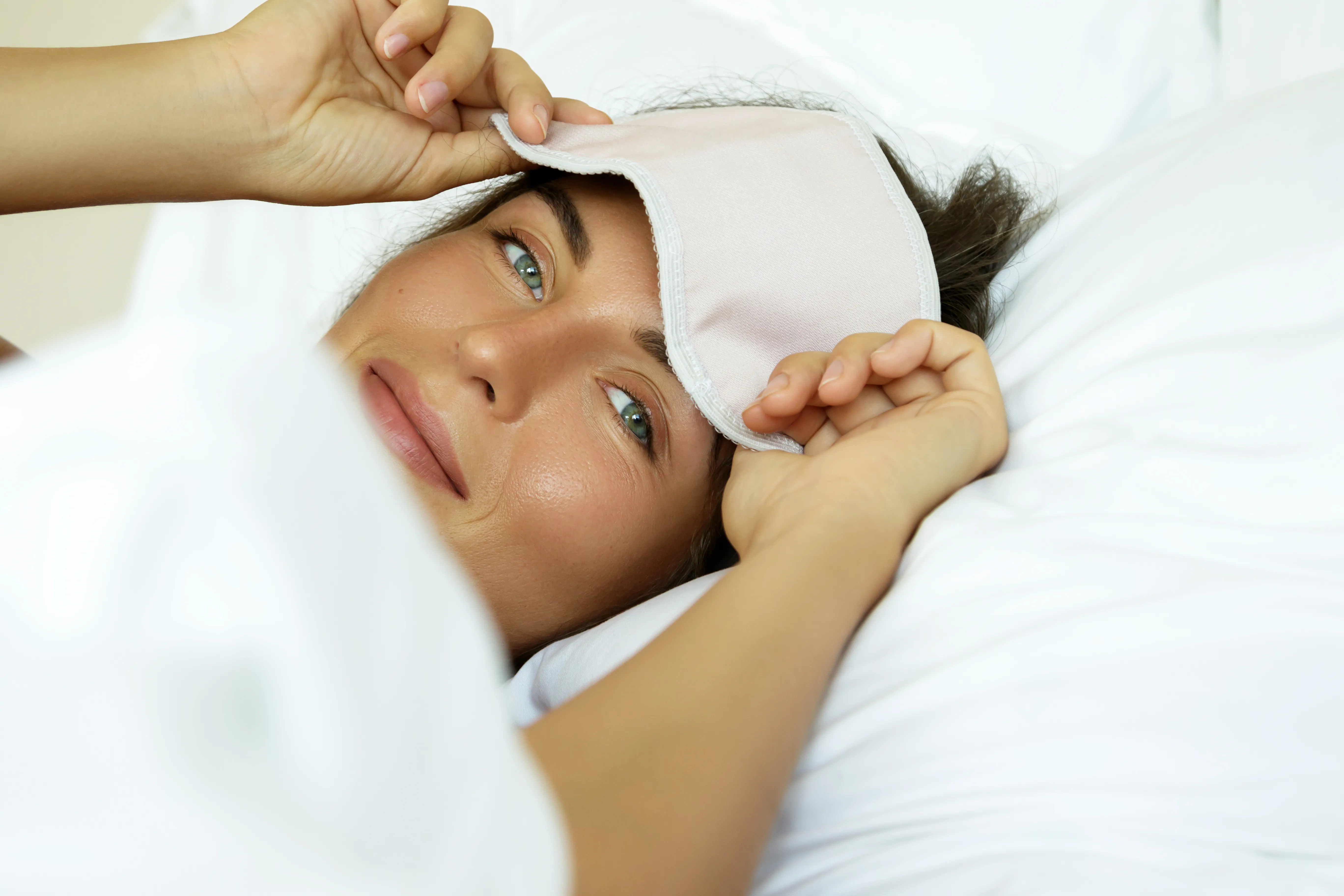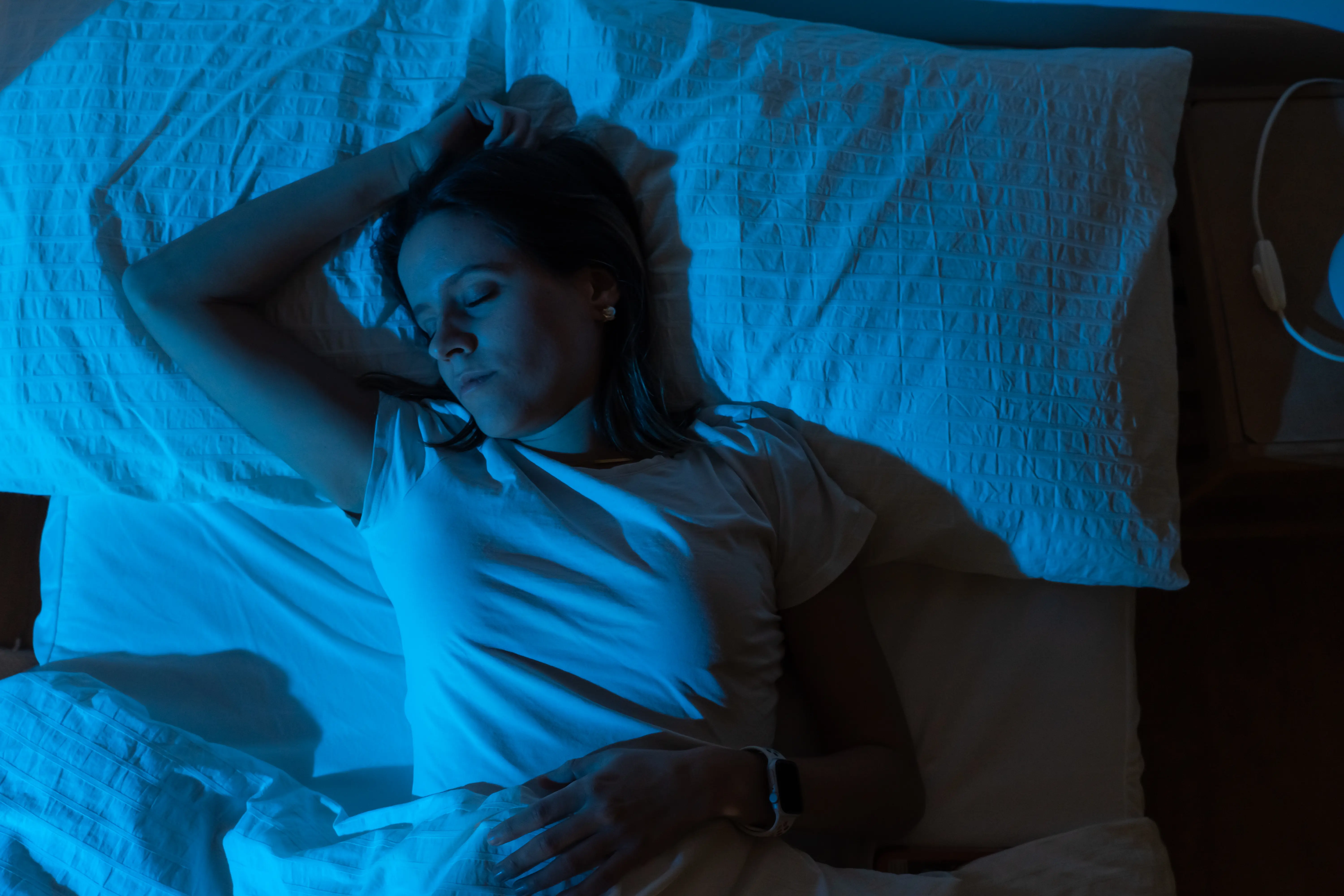Night sweats, or excessive sweating during sleep, can be a disruptive and concerning symptom. While occasional sweating at night may simply result from a warm sleeping environment, persistent or severe night sweats could indicate an underlying health issue.
Various factors, including medical conditions, lifestyle habits, and hormonal imbalances, can contribute to night sweats.
Understanding the causes and potential treatments can help you manage this condition effectively, which we’re going to discuss in this article.
The Body’s Temperature Regulation During Sleep
The human body works to maintain a balance of temperature regulation throughout the sleep cycle. The hypothalamus, the brain’s thermostat, controls this process by adjusting body heat in response to external and internal factors. At night, body temperature naturally drops as part of the sleep-wake cycle, helping facilitate rest.
What Causes Night Sweats?

Night sweats can result from a range of factors, including medical conditions, lifestyle habits, and environmental influences. While occasional night sweating may be harmless and linked to external factors such as room temperature or bedding choices, persistent or excessive sweating during sleep can indicate an underlying issue.
However, these causes are not strict; individuals react differently, and while one person may experience night sweats due to a certain trigger, another with the same condition may not.
Understanding these potential triggers can help determine the best approach to managing and preventing night sweats effectively.
In the following sections, we will discuss the factors that can cause night sweats in detail.
Mental Health
- Generalized Anxiety and Panic Attacks: Anxiety, including generalized anxiety disorder (GAD) and panic disorder, can contribute to night sweats due to the body's rising stress levels. When anxiety levels rise, the nervous system triggers the release of adrenaline, increasing heart rate and body temperature. In some cases, individuals experience nocturnal panic attacks, which can cause excessive sweating during sleep.
- Post-Traumatic Stress Disorder (PTSD): People with PTSD often experience night sweats as a result of frequent nightmares. Traumatic memories can activate the body’s stress response, causing an increase in cortisol and adrenaline levels. This can lead to excessive sweating during sleep, particularly in individuals who experience vivid flashbacks or nightmares.
- Depression and Mood Disorders: Depression and other mood disorders can also play a role in night sweats, particularly due to their effects on the nervous system and hormone levels. Changes in neurotransmitters like serotonin and dopamine may interfere with the body's ability to regulate temperature effectively.
Poor Sleep Hygiene and Lifestyle Factors
- Irregular Sleep Schedules: Maintaining inconsistent sleep patterns can disrupt the body's circadian rhythm, affecting temperature regulation during sleep. Irregular sleep schedules may interfere with the body's ability to cool down at night, leading to excessive sweating. Additionally, sleep deprivation and insufficient sleeping hours can heighten stress levels, which further contributes to night sweats.
- Eating Spicy Foods: Consuming spicy foods, especially close to bedtime, can trigger an increase in body temperature and induce sweating. Spicy ingredients stimulate nerve receptors that signal heat, causing the body to sweat as a cooling mechanism.
- Uncomfortable Room Temperature: A bedroom that is too warm or sleeping on a heat-retaining bed can prevent the body from cooling down naturally during sleep, increasing the chances of night sweats. Keeping the room at a cool temperature can help reduce excessive sweating.
- Use of Heavy Blankets: Thick, insulating blankets can trap body heat and prevent the natural cooling process that occurs during sleep. While cozy in colder months, heavy blankets can lead to excessive warmth, triggering night sweats.
Hormonal Imbalances
- Menopause and Perimenopause: Irregular estrogen levels during menopause and perimenopause can significantly impact the body's ability to regulate temperature. Many women experience sudden hot flashes and night sweats due to hormonal changes, which can disrupt sleep and lead to discomfort.
- Pregnancy and Postpartum: Hormonal shifts during pregnancy and after childbirth can cause excessive sweating, including night sweats. Increased blood flow, metabolic changes, and changes in progesterone and estrogen levels all contribute to temperature dysregulation, making night sweats a common postpartum symptom.
- Hyperthyroidism (Overactive Thyroid): An overactive thyroid increases the body's metabolism, leading to excessive heat production and sweating. People with hyperthyroidism may experience persistent night sweats, along with symptoms such as rapid heart rate, unintended weight loss, and nervousness.
- Testosterone Fluctuations in Men: Testosterone imbalances, whether due to aging, medical conditions, or hormone therapy, can contribute to night sweats and impact overall sleep quality. Low testosterone levels in men are often linked to the disruption of the body's ability to regulate temperature properly.
Infections and Illnesses
- Tuberculosis (TB): A major symptom of tuberculosis is persistent night sweats, often accompanied by fever, fatigue, and weight loss. The body's immune response to the bacterial infection triggers excessive sweating, particularly at night.
- HIV/AIDS: HIV can cause night sweats due to immune system dysfunction and frequent infections. People with advanced HIV or AIDS often experience prolonged episodes of sweating, which can be worsened by coexisting infections or fevers.
- Brucellosis and Other Bacterial Infections: Brucellosis, a bacterial infection transmitted from animals to humans, can lead to fever and night sweats. Other bacterial infections, such as certain urinary tract or respiratory infections, may also trigger similar sweating episodes.
Substance Use and Alcohol Withdrawal
- Alcohol and Night Sweats: Alcohol consumption affects the nervous system and can lead to sweating, especially at night. The body works to metabolize alcohol, which increases heart rate, often resulting in excessive sweating.
- Caffeine and Stimulants: Caffeine, nicotine, and other stimulants can overstimulate the nervous system, leading to night sweats. These substances can raise heart rate, increase body temperature, and interfere with the body's natural cooling mechanisms.
- Withdrawal From Medications or Drugs: Stopping certain medications can cause withdrawal symptoms such as night sweats. The body's adjustment to the absence of these substances often results in temperature changes and excessive sweating.
Cancer and Night Sweats
- Lymphoma and Leukemia: Certain cancers, particularly lymphoma and leukemia, are strongly associated with night sweats. These conditions trigger immune system responses that lead to persistent sweating, often accompanied by fever and unexplained weight loss.
- Other Cancers That Affect the Immune or Endocrine System: Cancers that impact hormone production or the immune system, such as adrenal gland tumors or certain types of lung cancer, can contribute to night sweats. These conditions often interfere with the body's ability to regulate temperature properly.
- Cancer-Related Fevers and Metabolic Changes: Many cancer patients experience fever-related night sweats due to the body's inflammatory response to tumor growth. Additionally, increased metabolic activity associated with cancer progression can lead to excessive heat and sweating.
Neurological Conditions
- Parkinson’s Disease: Parkinson’s disease affects the nervous system, leading to disruptions in the body's ability to regulate temperature. Many people with Parkinson’s experience excessive sweating, including night sweats, due to nervous system dysfunction.
- Autonomic Nervous System Disorders: Conditions affecting the autonomic nervous system, which controls involuntary bodily functions, can lead to temperature regulation issues. Conditions such as multiple system atrophy (MSA) or autonomic neuropathy can cause excessive sweating, including during sleep.
- Stroke and Post-Stroke Symptoms: Strokes can damage the parts of the brain responsible for temperature control, leading to abnormal sweating patterns. Some stroke survivors experience night sweats as part of their post-stroke recovery, often due to nervous system imbalances.
- Hypoglycemia: Low blood sugar can trigger excessive sweating, including at night. This is especially common in individuals with diabetes who take insulin or certain medications, as drops in blood sugar levels can activate the body's stress response, causing sweating.
Other Medical Conditions
- Chronic Fatigue Syndrome (CFS): CFS is a complex condition that causes extreme fatigue, sleep disturbances, and temperature regulation issues. Many individuals with CFS report night sweats as a symptom, often linked to immune system dysfunction and hormonal imbalances.
- Insomnia: Poor sleep quality and frequent awakenings can contribute to night sweats, as the body’s stress response may be activated during disrupted sleep. People struggling with insomnia often experience heightened sensitivity to temperature changes, leading to excessive sweating.
- Obstructive Sleep Apnea (OSA): OSA is a sleep disorder that causes repeated interruptions in breathing during sleep, leading to oxygen deprivation and increased body temperature. Many individuals with sleep apnea have night sweats due to the strain on the cardiovascular and nervous systems.
- Hyperhidrosis (Excessive Sweating): Hyperhidrosis is a condition that causes excessive sweating, often beyond what the body needs for temperature regulation. While it commonly affects the hands, feet, and underarms, some people with secondary hyperhidrosis experience night sweats as part of their symptoms, especially if triggered by an underlying medical condition.
Medications
There are several medications that can contribute to night sweats as a side effect, such as antidepressants, hormone therapy medications, and birth control. Additionally, fever reducers like aspirin and acetaminophen work by lowering body temperature, often promoting sweating as part of the process.
These medications can disrupt your body's temperature regulation, making you more prone to overheating and excessive sweating while you sleep.
Below is a table grouping various medications that may cause night sweats as a side effect, along with their primary use.
| Medications | Primary Use | Why it Causes Night Sweats |
|---|---|---|
| SSRIs (Fluoxetine, Sertraline) | Antidepressants | Affects neurotransmitters that regulate body temperature |
| Aspirin, Acetaminophen | Fever Reducers and Pain Relievers | Induces sweating as a way to lower body temperature |
| Propranolol, Metoprolol | Beta-blockers (Blood Pressure & Cardiovascular Medications) | Interferes with the body's ability to regulate sweating |
| Amlodipine, Verapamil | Calcium Channel Blockers (Blood Pressure & Cardiovascular Medications) | Dilates blood vessels, leading to changes in body heat |
| Insulin, Sulfonylureas, Metformin | Diabetes Medication | Affects blood sugar levels and thermoregulation |
When to See a Doctor about Night Sweats
While occasional night sweats can be harmless, frequent or severe episodes may indicate an underlying health issue. If they persist, occur alongside other concerning symptoms, or disrupt sleep, medical evaluation is essential.
Below are some potential cases where seeking a doctor’s advice is necessary to determine the cause and receive appropriate treatment.
- Severe or Persistent Night Sweats: If night sweats occur regularly and do not seem to be linked to environmental factors or lifestyle choices, it may indicate an underlying medical condition. Seeking medical advice can help determine the cause and appropriate treatment.
- Night Sweats Accompanied by Unexplained Weight Loss: Unintentional weight loss along with night sweats can be a warning sign of serious health issues, including infections, hormonal imbalances, or even certain cancers. A doctor should evaluate these symptoms to point out any concerning conditions.
- Fever, Chills, or Signs of Infection: Night sweats combined with fever, chills, or flu-like symptoms may suggest an ongoing infection or another bacterial or viral illness. Immediate medical evaluation is necessary to determine the cause and begin early treatment if needed.
- Changes in Appetite, Fatigue, or Other Unusual Symptoms: A decrease in appetite, persistent fatigue, or additional symptoms like dizziness or weakness could signal an underlying metabolic, hormonal, or immune-related disorder. Consulting a doctor can help identify potential health concerns.
- Worsening of an Existing Medical Condition: Individuals with pre-existing conditions such as diabetes, thyroid disorders, or neurological diseases who experience worsening night sweats should discuss these changes with their doctor.
How to Prevent and Reduce Night Sweats

Preventing and reducing night sweats often requires lifestyle adjustments, environmental changes, and medical treatments.
In this section, we’ll be digesting a few effective ways to minimize night sweats, from optimizing your sleep environment to adopting healthier daily habits.
Adjusting Your Sleep Environment
- Bedroom Temperature: Keeping your bedroom cool is essential for preventing night sweats. The ideal sleep temperature is around 60–67°F (16–19°C). Using a fan or air conditioning can help regulate heat and create a comfortable sleeping environment.
- Breathable Bedding and Sleepwear: Choosing lightweight, moisture-wicking fabrics such as cotton or bamboo can help reduce overheating. Heavy or synthetic materials trap heat and may contribute to excessive sweating during the night.
- Cooling Mattress and Pillows: Memory foam and other heat-retaining materials can worsen night sweats. Choosing a hybrid cooling mattress, gel-infused pillows, or moisture-wicking mattress toppers can promote temperature regulation and airflow.
- Proper Ventilation and Airflow: A well-ventilated room helps prevent heat buildup, especially in warmer climates. Keeping windows open, using ceiling fans, or placing an air purifier with a cooling function can enhance air circulation.
Lifestyle Changes and Home Remedies
- Hydration and Diet Adjustments: Staying hydrated throughout the day helps regulate body temperature. Reducing caffeine, alcohol, and spicy foods, especially before bed, can minimize sweating triggers.
- Stress Management Techniques: Since anxiety and stress can contribute to night sweats, practicing relaxation techniques such as deep breathing, meditation, or yoga before bed can help regulate the nervous system and improve sleep quality.
- Exercise and Sleep Routine: Regular physical activity supports overall health and stress reduction, but exercising too close to bedtime may increase body temperature. Establishing a consistent sleep schedule and a relaxing bedtime routine can promote restful sleep.
Medications for Persistent Night Sweats
- Hormone Therapy: For individuals experiencing night sweats due to hormonal changes, such as menopause or low testosterone, hormone replacement therapy may help regulate temperature fluctuations. However, it should only be used under medical supervision.
- Medications for Temperature Regulation: Certain medications, such as low-dose antidepressants or prescription antiperspirants, can help manage night sweats in some cases. Doctors may also recommend medications like clonidine or gabapentin for symptom relief.
- Treating Underlying Medical Conditions: Addressing the root cause of night sweats, whether it be an infection, sleep disorder, or chronic illness, can help resolve symptoms. Proper treatment, medication adjustments, or lifestyle changes may be necessary to manage persistent sweating effectively.
FAQS
Why am I getting night sweats?
Night sweats can be caused by a variety of factors, including medical conditions, hormonal changes, medications, and lifestyle habits. Your body may be reacting to an underlying issue such as an infection, sleep disorder, or stress-related triggers. Identifying the cause often requires evaluating your environment, diet, and overall health.
Are night sweats always a sign of a medical condition?
Not necessarily; many cases of night sweats are linked to external factors such as room temperature, bedding, or diet. However, persistent or severe night sweats may indicate an underlying health condition that requires medical attention. Monitoring additional symptoms can help determine if further evaluation is needed.
When should I see a doctor about night sweats?
You should consult a doctor if your night sweats are frequent, severe, or accompanied by other symptoms such as fever, unexplained weight loss, or extreme fatigue. These could indicate infections, hormonal imbalances, or even more serious conditions like cancer.
Can stress and anxiety cause night sweats?
Yes, stress and anxiety can activate the body’s fight-or-flight response or elevate stress hormones, leading to excessive sweating, including at night. Managing stress through relaxation techniques, therapy, or lifestyle changes may help reduce night sweats.
What medications can cause night sweats?
Certain medications, including antidepressants, hormone therapies, and fever reducers, can list night sweats as a side effect. Some prescription drugs used to treat diabetes, blood pressure, and cancer may also contribute to excessive sweating, which in this case, consulting a doctor about alternative options may be beneficial.
Conclusion
Night sweats can be a disruptive and uncomfortable experience, but they are often manageable with the right lifestyle adjustments and medical guidance. Understanding the potential causes, ranging from environmental factors to medical conditions, can help you take the necessary steps toward relief.
Dom Abraham
As the lead content writer at Sleepiverse. Dom pours his heart into writing mattress reviews, bedding product reviews, and medically-reviewed health articles. Dom is from Portugal and likes to spend his free time writing on the beach as it gives him a sense of comfort. Aside from writing mattress reviews in front of the soothing beach view, Dom likes to experiment with new amazing food ideas.


